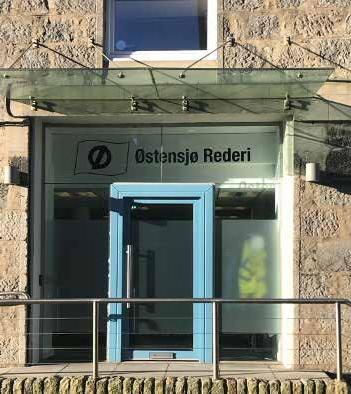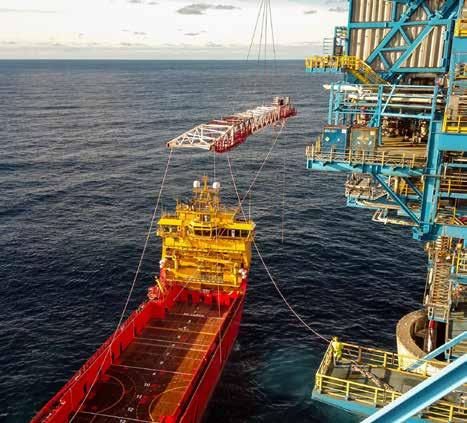
8 minute read
The Man in the Middle of our Scottish Network
- The office in Aberdeen has been a important part of the operation in Østensjø for many years. Our charters like to have that local place to visit and speak directly to a representative, at its most basic level, says Phil Brown (52), Area Manager Offshore & Renewables, UK.
BY TERJE EMIL JOHANNESSEN
Advertisement
Located at Nautilus House, 35 Waterloo Quay in Aberdeen, Phil has built a large network for the shipping company in the UK during the last six years. When I ask him to say something about the effect of having an office in Aberdeen, he reminds me of this basic human reality: - As humans we need that face to face interaction having the capability to drive a short distance and have an open and honest conversation is paramount to a good working relationship. As we have moved into the renewables sector the same need is highlighted, and local content is very important.
You have a long maritime background and worked for big international companies. What was it that led you to be positive when you were offered a job at Østensjø Rederi? - In 2008, I was fortunate to work with an Oil Majors’ offshore supply vessel fleet which consisted of several vessels supplied by a few operators, mainly Norwegian owned, to which Østensjø was part of this fleet. As part of my role was to regularly visit the vessels, along with the Charterer’s representative and amongst other duties promote the Charterers Safety Program to the Officers’ and Crews’, he explain and continues:
WHY ARE ØSTENSJØ DIFFERENT?
- Over a period of 6 years working closely with the Østensjø fleet, I would say the Østensjø ships where at the «top of their game» and there was something different as a whole. A few of the other fleet OSV’s crew showed the same, but not as a collective. I was curious to understand: why are the Østensjø ships and the crews different? Of course, and this is purely my view having worked
The man in the middle, Phil Brown.
with, and trained many seafarers over my career, I would say it is Mindset, Leadership and Trust. It is common knowledge that all Norwegian built vessels in any marine sector are well designed, well built and operated by competent, professional crews, the same can be said, in some cases for the British maritime sector too. As we say over here «you get what you pay for». This goes a long way in providing an unrivalled service, I saw this in the Østensjø fleet and crews, says Phil.
WISHED TO JOIN THE ØSTENSJØ FAMILY.
- What is important to me and has been in my whole career, when I wake up in a morning or when I joined a vessel, I wanted to do it and enjoyed the time, of course there are «challenges» or I like to call them «opportunities», in every position/job. However, when I get that feeling of «I do not wish to be here or onboard this vessel anymore» it’s time to leave. I got the feeling that I wished to join and be part of the Østensjø family.
- AND WHAT DID YOU PARTICULARLY NOTICE?
- The insights into the culture of Østensjø during my non-official visits, where I visited the vessels for a coffee, “sometimes lunch” (am sure some readers will laugh at that comment) was when I understand what is going on and how the ship’s crew felt/ believed. Following these many chats onboard, over the years across all ranks the view was of openness, focus and understanding of what was required from them, their Minset, of course they had the right tools to do it. I really got to know the crews and as I saw it, trust was built. As it is all about reciprocity and trust in my view.
THE ØSTENSJØ CULTURE
Phil Brown has even more on his mind about this question: - Having this mindset from the owner and top level leaders creates a mindset from those the leadership choses to operate their ships, and those that operate the ships have confidence in the equipment they use and the onshore support. I got the feeling that Østensjø had that open and honest approach no matter what rank or position you held. The culture was you are free to respectively express that view; it may not be the right view given the whole, but at least you have the opportunity to express, and that is a good culture in my view. This was the differentiator about Østensjø, he emphasizes.
- THE EYES OVER YOUR SHOULDER
- You have gradually gained sufficient experience to be able to say something about whether there is an exciting difference between Scottish/British and Norwegian maritime culture? May be also differences in business ethics?
- An aspect I have experienced since working directly with Norwegian nationals is the focus, they have on the job not only with safety but also service, pride in their role and their temporary home onboard. When you have a nice working environment, the tasks are made a lot safer and easier. In the British maritime industry, there are those factors too, but as British we sometimes do not see what is directly in front of us or see the bigger picture. This I feel, emanates from the points mentioned above as their working equipment is the best, the support is good and the owner, senior leaders understand they have employed competent people to do the job.
- To be honest - my experience from the British culture is the prevalence of “micro-management” from leaders, that constant pair of eyes over your shoulder, sometimes unjustly critical of daily decisions. I have been employed for my skills, ability and the right behavior and I am an adult.
TO BE TREATED AS A PERSON, NOT AS A NUMBER
Phil believes that if the senior leaders need “micro-management” then there are two questions to ask “have I employed the right people?” for the organisation or “is my management style, the right style?”. - To get the best out of the people so we are all successful, I sense that in the Norwegian culture this trait is not as prevalent. Secondly, you are treated as a person and not as a number, unfortunately British business (I must say not all) have a totally different view of how to get to the end game, us Brits tend start work early, some even before 6am and work late, even weekends, this of course for some business owners’ is great news and they welcome the sometimes excessive hours worked, he adds: - The Norwegian’s have a different view and yet they have the same requirements, to be successful, profitable and have a good reputation. The work hours tend to be less, but the results are the same and the work/life balance is correct.
TO READ BETWEEN THE LINES
- Are there elements in Scottish/British business culture that we Norwegians struggle to understand? - Professionally, possibly the hardness is our approach to working life, although as time as moved the working environment for the new generation is a lot better than in the “good old days”, we can be passionate, but it sometime comes across as militant and obstructive. But like I learnt early on working with Østensjø and understand-
The man in the middle, Phil Brown.

ing an email from the Master of a ship, the best policy is to read between the lines before making a critical judgment, says Phil, takes a shorth breath, and add: - Of course, we have a strange sense of humor or well I do at least, I hope the Østensjø family understand me by now.
THE RENEWABLES IS THE NEW WAY
- How do you assess the market opportunities for Østensjø in the British sector? - The offshore industry and now the new renewables market is worldwide, but very local if you get the point. Keeping my ear to ground and speaking with many people across the maritime sector allows some insight as to what may be on the horizon. The renewables is the new way and very exciting that we are a part of it and no doubt develop the same reputation for excellent ships and excellent services like we have in Oil and Gas. This is due to the excellent people not just one individual.
THIRTY YEARS LATER HE IS STILL THERE
Phil Brown came to Aberdeen in 1990 for a social weekend while working for a maritime training center in his hometown of Grimsby. Thirty years later he is still there. - I have two Sons, Jack (21) and Harry (15), my eldest Jack has left home and lives in Edinburgh but Harry being a little younger has not “flown the nest” just yet and lives in a small village on the North East Coast of Scotland with his Mum. We enjoy our time and holidays together whether it be a cruiser on the Caledonian Canal, a Motorhome on the Isle of Mull or the great Scottish outdoors walking the Munro’s, hills and glens. - Do you have time for some hobbies - My main passion away from work is collecting 19th and 20th Century first edition books on what is probably a peculiar subject on Totalitarianism, it fascinates me how some humans can do some terrible things given a certain situation/environment. And more worryingly I see the same story(although wearing a different coat) potentially unravelling in the 21st century, answers Phil.










